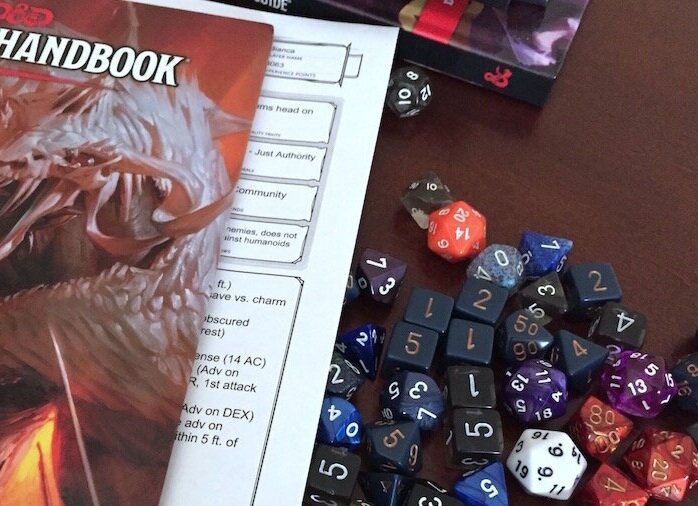Dungeons & Dragons: No Longer a Basement Fantasy
Formerly just a table-top game, D&D has resurged in popularity during COVID
By Dustin Bailey
Dungeons & Dragons typically conjures up images of the uber-nerd preteen swinging a sword, or dressing up as a wizard in their parent’s basement. That sort of high-fantasy geekiness has often been enough to keep the game, and its enthusiasts, on the fringes.
Nevertheless, during an unprecedented time, the table-top, pen-and-paper roleplaying game has seen a surprising resurgence. Shedding the stigma of its fringe status, at its core, D&D offers newcomers in the pandemic combined comforts that have reached a new premium: social connection and escapism.
The game has seen peaks and valleys in the past, with popularity typically spiking as a new “edition” of the game is released. In 2014, the game saw its usual jump in popularity with the release of its 5th edition. What is unusual however, is the overwhelming wave of interest D&D found in the last year and a half.
Since the beginning of quarantine, the D&D live-stream Critical Role has become a sensation. While the group accumulated quite a loyal following pre-pandemic, their popularity has since skyrocketed. On platforms such as Twitch and YouTube, the group of voice actors from Los Angeles present weekly episodic adventures led by fellow voice actor and dungeon master, Matthew Mercer.
Now in its second season, Critical Role has garnered over 188 million views on YouTube. Last summer, the program’s production company—owned by Mercer and the other cast members—aimed to transform their first season of adventures into an animated short feature, launching a Kickstarter campaign.
In less than 40 minutes, the campaign’s $750,000 goal for a single 22-minute episode was shattered. The project broke Kickstarter’s record for the highest-funded TV, film, or animation project by raising a staggering $11.3m from nearly 90 thousand backers. The show has since been picked up by Amazon and is slated for two 12-episode seasons.
A game that is played with no board, no controller, a loose ruleset, a couple of strange dice, and reliance on the participants’ imagination has always been a tough sell. Players are expected to imagine scenarios described to them by the “DM”, and to react in ways that their created character might react. It is that immersion into a fictional character—the requirement to act, and in essence, to play pretend with other adults—that tends to initially turn people away. It is also what makes the game stand out as a social activity.
In a recent interview on Phillip DeFranco’s podcast, A Conversation With, Mercer gave his take on why the game is seeing an uptick, as people are searching for new ways to socialize with friends. “What role-playing games really are is a toolset, and permission for anybody to create their own stories, and there aren't a lot of forms of media out there that are that invitation.” He also says, “You yourselves can create these sweeping stories, and they're for you.”
Since the explosion of Critical Role, many other media creators have jumped at the opportunity to create episodic shows around the decades-old game. College Humor, a popular web production company, has a series called Dimension 20 hosted on their streaming service, Dropout, in which the cast—an intrepid group of improvisation veterans—are led on often-comedic adventures by their fellow cast member and host, Brennan Lee Mulligan.
Mulligan, a native New Yorker, bases the show’s latest season, The Unsleeping City, on a fantasized version of New York City. He seems to find the new mass appeal of D&D streaming as surprising as anyone. In an interview with arts and culture magazine, 34st Street, Mulligan said, “If people wonder what my mental state is like walking around from day to day, it’s just a constant wide–eyed daze that I am a dungeon master for a job.”
Aside from media content creators, sites hosting services for online tabletop games have seen immense traffic increases. In a recent interview, Doug Davison, President of SmiteWorks USA, told the Washington Post, “We saw an initial burst of new users at nearly 15 times our normal rate.” Davison who oversees the Fantasy Grounds site, goes on to say, “It is starting to settle down now, but we are still trending at around five times the rate of new user acquisition we saw last year.”
So, why now? Certainly, some rise in popularity is to be expected; for instance, the hit tv shows Stranger Things and Community have thrust the game into the cultural zeitgeist. Not to mention, high-profile celebrities publicly tout their fandom for D&D—Stephen Colbert, Joe Manginiello, Chris Hardwick, Deborah Ann Woll, and Jon Favreau, to name a few.
Perhaps it’s a reflection of a generation growing up with the Young Adult novel in full swing, often depicting fantasy settings. It’s reasonable to wonder if Harry Potter, Percy Jackson, and Twilight have prepared us for considering the possibilities of stepping into the shoes of a fantastical protagonist.
But perhaps there is something much simpler at work, something that our collective isolation has brought to the surface: that we are social creatures who enjoy stories. As it just so happens, that’s exactly where an unassuming table-top game of imagination from the depths of the 1970’s basement fits in just perfectly.


